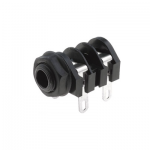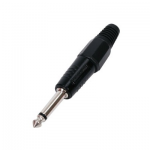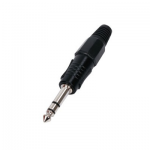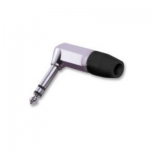Call Us Now:
0345 193 0615
 The Jack Plug (also called an audio jack, phone plug, stereo plug, mini-jack), is a common audio connector. It is cylindrical in shape with two, three, or four contact points separated by insulating material.
The Jack Plug (also called an audio jack, phone plug, stereo plug, mini-jack), is a common audio connector. It is cylindrical in shape with two, three, or four contact points separated by insulating material.
Officially the Jack is the socket, but in common parlance the word has come to be used for both types – so make sure that you choose the right one! In the UK, the terms jack plug and jack socket are commonly used for the respectively male and female connectors in order to avoid confusion.
The Jack plug was invented for use in telephone switchboards in the 19th century and is still widely used, both in its original 6.3 mm (1/4″) size and in miniaturized versions 3.5 mm (1/8″) and 2.5 mm (3/32″).
Common uses are:
| 6.3mm | Guitars, Microphones, Keyboards, Effects Pedals, Professional Headphones, Mixing Consoles, Patch Bays, etc. |
| 3.5mm | Headphones, Computer Audio, AV connections |
| 2.5mm | Mobile and Cordless Telephone Headsets |
Plug Type Names
The plug types are known by various names. The common descriptive names are derived from the names of the three possible conducting parts of the plug: Tip, Ring, and Sleeve.
| Number of Contacts | Descriptive Name | Alternative Names |
| 2 | TS | Mono jack, guitar jack |
| 3 | TRS | Stereo jack, headphone jack |
| 4 | TRRS | 4 pole jack, quad jack, AV jack |
The differences between these types are clearly shown in the diagrams below:
|
|
|
|
TS (Mono) Jack Plug |
TRS (Stereo) Jack Plug |
|
|
|
|
TRRS (Quad / 4 Pole) Jack Plug |
|
Jack Wiring
The modern profile three-conductor jack plug was originally designed for stereo signal connections, with the left channel on the tip, right channel on the ring and common return on the body or sleeve.
The tip ring sleeve descriptive names are more common in some English speaking countries than others. In the UK the term stereo jack plug is probably the most common, even for connectors not used to carry stereo signals. The term TRS is particularly appropriate to distinguish these three-conductor (stereo) plugs used in other than stereo applications. Examples are shown in the table below:
|
Unbalanced Output |
Unbalanced Input |
Unbalanced Insert |
Balanced |
Stereo |
|
| Tip | Signal | Signal | Send or Return signal | Positive/”Hot” | Left channel |
| Ring | Ground or No Connection | Ground or No Connection | Return or Send signal | Negative/”Cold” | Right channel |
| Sleeve | Ground | Ground | Ground | Ground | Ground |
Colour Codes
Moulded connectors for computer audio are often colour coded. These colour codes were standardised by Microsoft and Intel in 1999 for computers as part of the PC99 standard:
| Colour | Connector | Function |
| Green | TRS 3.5mm | stereo output, front channels or headphones |
| Black | TRS 3.5mm | stereo output, rear channels |
| Grey | TRS 3.5mm | stereo output, side channels |
| Gold | TRS 3.5mm | dual output, center and subwoofer |
| Blue | TRS 3.5mm | stereo input, line level |
| Pink | TRS 3.5mm | mono or stereo microphone input |
Jack Sockets
There are two main types of Jack Socket, Chassis or Panel mounting and Line sockets. Line sockets are mounted on a cable whilst chassis sockets are mounted directly into equipment.
|
|
|
|
|
|
|
Open and Closed 3.5mm Line Sockets |
D type Locking 6.35mm Chassis Socket |
Open 6.35mm Chassis Socket |
Closed 6.35mm Plastic Chassis Socket |
HQ Gold Line sockets |
Leads Direct makes great efforts to provide accurate and complete information. However, portions of the information contained in this website and any documents viewed on it or downloaded from it may be incorrect or not current. Any errors or omissions should be reported for investigation and correction. The information provided in any documents whether on our website or otherwise is provided "as is." No warranty of any kind, implied, expressed, or statutory, including but not limited to the warranties of non-infringement of third party rights, title, merchantability, fitness for a particular purpose, and freedom from computer virus, is given.




£2.64
£3.17 inc VAT NSBSJ63RABAdd to cart